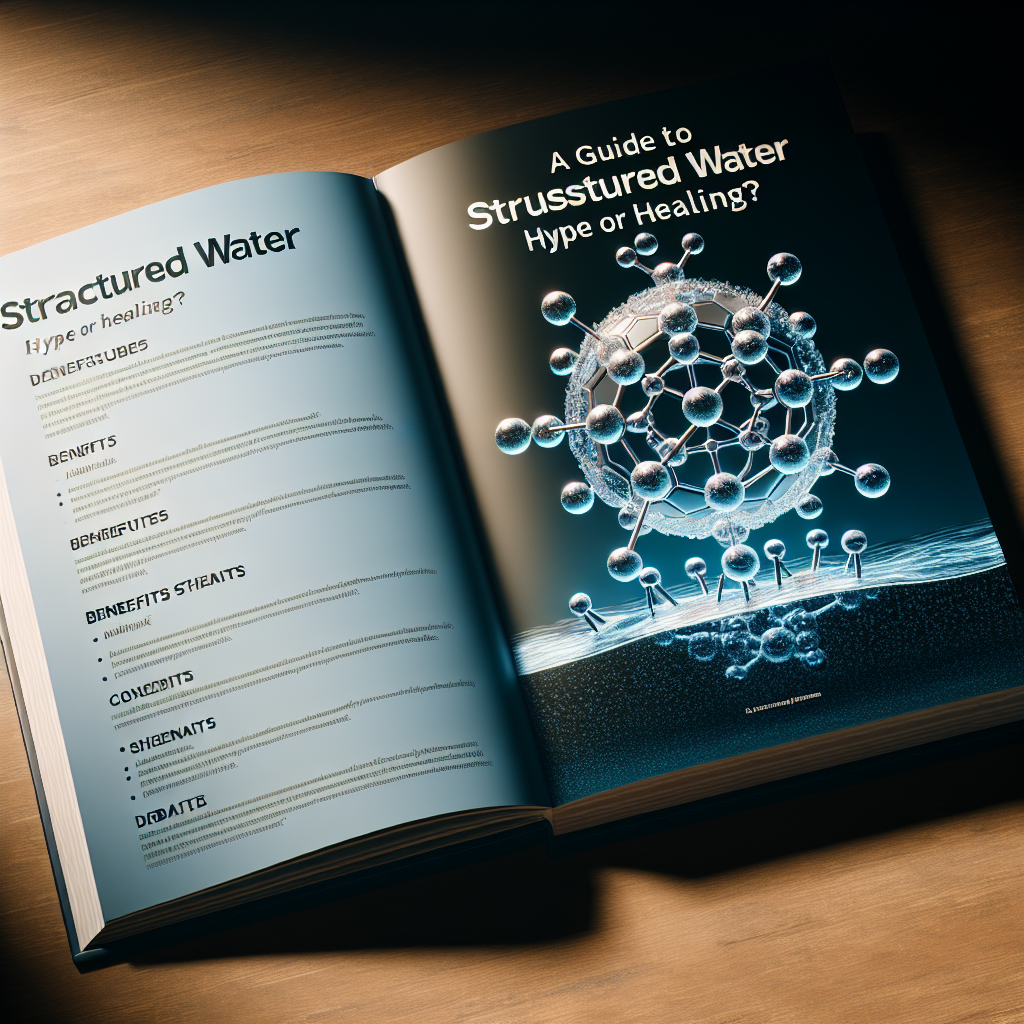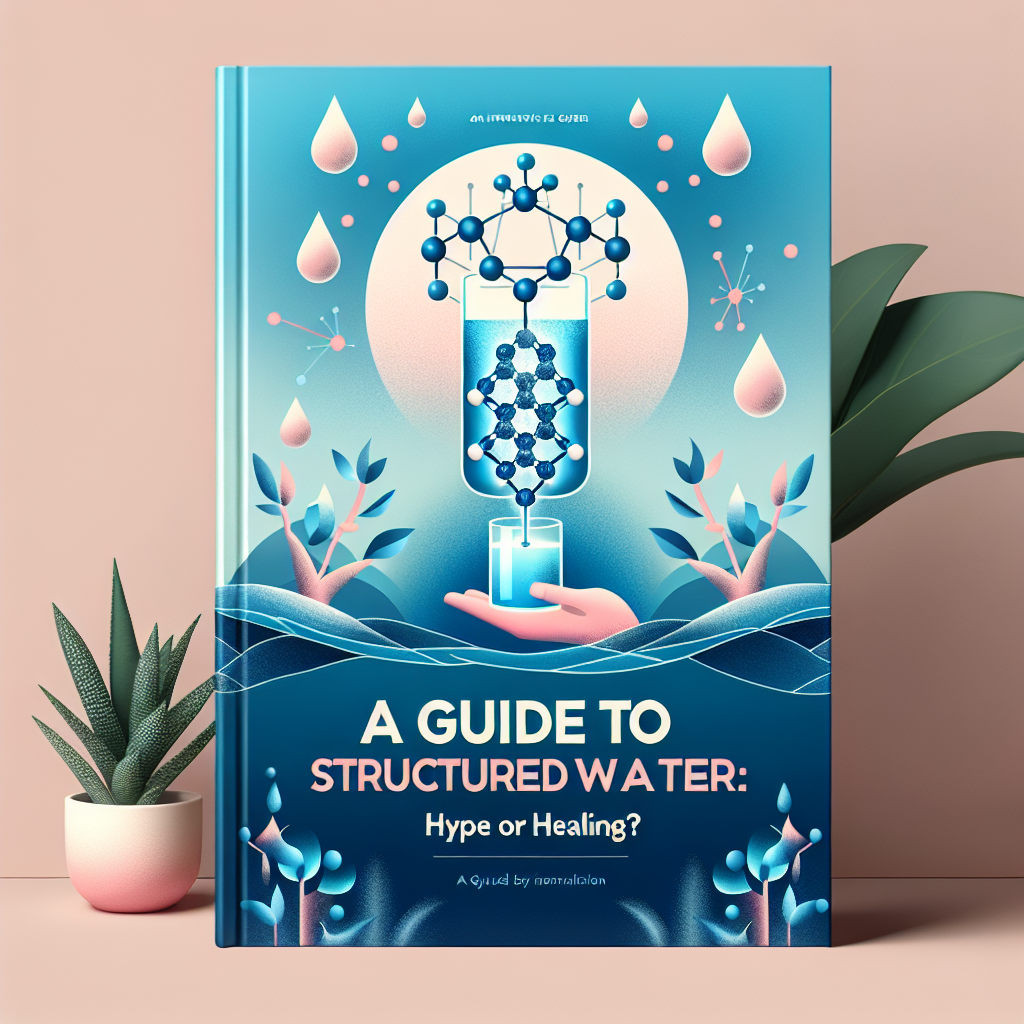A Guide to Structured Water: Hype or Healing?

Discover the truth about structured water! Is it hype or healing? Find out in our comprehensive guide. Don’t wait, learn more today! Click here to get started.
Understanding Structured Water: A Comprehensive Guide to Its Healing Properties
Structured water, a term that has been making waves in the health and wellness industry, is a concept that has intrigued many and left others skeptical. This article aims to provide a comprehensive guide to understanding structured water and its purported healing properties, helping you to discern whether it is a health hype or a genuine healing phenomenon.
Structured water, also known as hexagonal water or living water, refers to water molecules that are organized in a specific, hexagonal shape. This arrangement is believed to occur naturally in pure spring water, glacial melt, and rainwater. The theory behind structured water is that this particular molecular arrangement makes the water more bioavailable, meaning it can be more easily absorbed and utilized by the body’s cells.
Proponents of structured water claim that it offers a myriad of health benefits. These include improved hydration, enhanced nutrient absorption, increased detoxification, boosted immune function, and overall improved health and vitality. The idea is that because structured water is more easily absorbed by the body, it can more effectively deliver nutrients to cells and remove waste products. This, in turn, is said to promote optimal cellular function and overall health.
However, it’s important to note that the scientific evidence supporting these claims is limited. While some studies suggest that structured water may have unique properties, the research is far from conclusive. Many scientists argue that more rigorous, peer-reviewed research is needed to substantively validate the health benefits of structured water.
Despite the lack of concrete scientific evidence, many people swear by the benefits of structured water. Anecdotal reports suggest that drinking structured water can lead to noticeable improvements in health and wellbeing. Some people report feeling more energized, experiencing better digestion, and noticing improvements in skin health after switching to structured water.
There are several ways to consume structured water. Some people opt to buy bottled structured water, while others invest in home devices that claim to structure tap water. These devices use various methods, such as vortexing, magnetizing, or adding minerals, to alter the structure of the water. However, it’s worth noting that these devices can be quite expensive, and their effectiveness is a topic of debate.
In conclusion, the concept of structured water is intriguing and holds potential, but it’s important to approach it with a critical eye. While some people report experiencing health benefits from drinking structured water, the scientific evidence to support these claims is currently lacking. Therefore, it’s advisable to maintain a balanced perspective and not to rely solely on structured water for health improvement.
If you’re interested in trying structured water, it’s recommended to do so as part of a balanced, healthy lifestyle. Remember, no single product or practice can replace the benefits of a varied diet, regular exercise, and adequate sleep. As with any new health practice, it’s always a good idea to consult with a healthcare professional before making significant changes to your routine.
In the realm of health and wellness, structured water is a fascinating topic that continues to spark debate. Whether it’s a health hype or a healing phenomenon, only time and further research will tell. Until then, it’s up to each individual to weigh the potential benefits against the lack of scientific evidence and make an informed decision.
Structured Water: Separating the Hype from the Health Benefits

Structured water, a term that has been making waves in the health and wellness industry, is often touted as a miracle elixir that can cure a myriad of health issues. From improving digestion and boosting energy levels to enhancing skin health and promoting weight loss, the purported benefits of structured water are indeed impressive. However, as with any health trend, it is crucial to separate the hype from the actual health benefits.
Structured water, also known as hexagonal water or living water, refers to water molecules that are organized in a specific, hexagonal pattern. This unique molecular arrangement is believed to enhance the bioavailability of water, making it easier for our cells to absorb and utilize. The concept of structured water is rooted in nature. It is said that water in its purest form, such as in springs and glaciers, naturally assumes this hexagonal structure.
The health benefits attributed to structured water are primarily based on the theory that its unique molecular structure allows for optimal hydration. Hydration is undeniably essential for our overall health and wellbeing. It aids in digestion, helps maintain healthy skin, supports the immune system, and plays a crucial role in various bodily functions. Therefore, the idea of consuming water that hydrates our bodies more efficiently is understandably appealing.
However, while the importance of hydration is well-established, the claim that structured water hydrates better than regular water is not backed by substantial scientific evidence. Most of the research on structured water is preliminary and conducted in vitro, meaning outside a living organism. Therefore, the results may not accurately reflect the effects of structured water on human health.
Moreover, the process of structuring water often involves the use of devices or additives that can alter the water’s composition. While some of these methods may indeed enhance the water’s bioavailability, others may introduce contaminants or unnecessary elements into the water. Therefore, it is essential to approach the concept of structured water with a discerning eye and a healthy dose of skepticism.
Despite the lack of concrete scientific evidence supporting the superior hydration benefits of structured water, many individuals swear by its positive effects on their health. Anecdotal evidence suggests that drinking structured water can lead to increased energy levels, improved digestion, better skin health, and even weight loss. However, it’s important to note that these benefits could also be attributed to increased water intake in general, rather than the specific structure of the water.
In conclusion, while the concept of structured water is intriguing, it is not a magic bullet for health and wellness. The health benefits attributed to structured water are largely unproven, and the methods used to structure water can vary greatly in their safety and effectiveness. Therefore, it is advisable to approach structured water with caution and skepticism.
Remember, the key to good health does not lie in a single solution, but in a balanced lifestyle that includes a varied diet, regular exercise, adequate sleep, and yes, proper hydration. Whether that hydration comes from structured water or regular tap water, the important thing is to drink enough to support your body’s needs. As always, it’s best to consult with a healthcare professional before making any significant changes to your diet or lifestyle.
The Science Behind Structured Water: Is it Hype or a Healing Miracle?
Structured water, a term that has been making waves in the health and wellness industry, is often touted as a miracle cure for a variety of ailments. But what exactly is structured water? Is it a revolutionary health breakthrough or just another health fad? Let’s delve into the science behind structured water to separate the hype from the healing.
Structured water, also known as hexagonal water or living water, refers to water molecules that are organized in a specific, hexagonal pattern. This is different from regular water, where the molecules are randomly arranged. Proponents of structured water claim that this unique molecular arrangement allows the water to be more easily absorbed by the body’s cells, leading to improved hydration and overall health.
The concept of structured water is based on the research of Dr. Masaru Emoto, a Japanese scientist who studied the effects of human consciousness on the molecular structure of water. Dr. Emoto’s experiments involved exposing water to different words, thoughts, and music, then freezing the water and examining the ice crystals under a microscope. He found that positive words and thoughts resulted in beautiful, symmetrical crystals, while negative words and thoughts resulted in disorganized, unattractive crystals. This led him to conclude that water has memory and can be influenced by human consciousness.
However, it’s important to note that Dr. Emoto’s research has been widely criticized by the scientific community. His experiments lacked proper controls and were not conducted under blind conditions, which means that the researchers knew which samples were exposed to positive or negative influences. This could have influenced their interpretation of the results. Furthermore, the formation of ice crystals is influenced by many factors, including temperature and impurities in the water, so it’s not clear that the observed differences were due to the influence of human consciousness.
Despite these criticisms, there are some scientific studies that support the potential benefits of structured water. For example, a study published in the Journal of Biological Physics in 2013 found that structured water can enhance the biological activity of cells, potentially leading to improved health. However, this research is still in its early stages, and more studies are needed to confirm these findings and understand how structured water affects the human body.
In terms of practical applications, there are several products on the market that claim to structure water, including water bottles, filters, and devices that use magnets or vortexes. However, these products are often expensive, and there’s little scientific evidence to support their effectiveness. It’s also worth noting that our bodies naturally structure water when we consume it, so it’s not clear that drinking pre-structured water provides any additional benefits.
In conclusion, while the concept of structured water is intriguing and there is some scientific research that suggests potential benefits, it’s important to approach this topic with a healthy dose of skepticism. The science behind structured water is still in its early stages, and many of the claims made by proponents of structured water are not supported by robust scientific evidence. As always, it’s a good idea to consult with a healthcare professional before making any major changes to your diet or health routine.